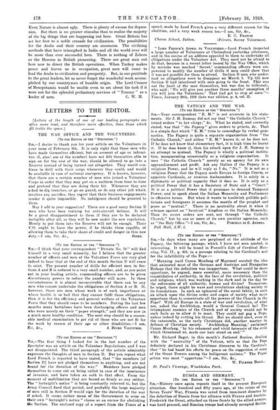[TO THE EDITOR OP THE " SPECTATOR.")
rnt,—The first thing I looked for in the last number of the Spectator was an article on the Volunteer Regulations, and I was not disappointed. The third paragraph of the article admirably expresses the thoughts of men in Section D. But you repeat what Lord French is reported to have stated, that " the members [of Section D] have not pledged themselves to anything, and are not bound for the duration of the war." Members have pledged themselves to come out on being called in case of the imminence of invasion, and have taken an oath to that effect. From the moment of mobilization they are bound as firmly as any soldier. The " fortnight's notice " is being constantly referred to, but the Army Council fixed that period, and probably the large majority of men still in Section D would sign for the duration of the war if asked. It seems rather mean of the Government to seize on their own "fortnight's notice " clause as an excuse for abolishing the Section. The enclosed copy of a report from the Times of a
speech made by Lord French gives a very different reason for the abolition, and a very weak reason too.—I am, Sir, he.,
E. C. FRANCIS " LORD FRENCH'S APPEAL TO Votnwrzeas.—Lord French inspected a large number of Volunteers at Chelmsford yesterday afternoon, and in the course of an address appealed to them to undertake all obligations under the Volunteer Act. They need not be afraid to do that, because in a recent letter issued by the War Office, which by mistake was marked ' Secret,' commanding officers were em- powered to modify the number of drills if men could show that it was not possible for them to attend. Section D men who under- took no obligations were to disappear on March 1. Up till now Section D had interfered with men going to the front. This was not the fault of the men themselves, but was due to tribunals, who said : We will give you another three months' exemption if you will join the Volunteers.' That had got to stop at once."— Times, January 28th, 1918 (late war edition, p. 4, col. 2).


























 Previous page
Previous page